Career Counseling by LLM
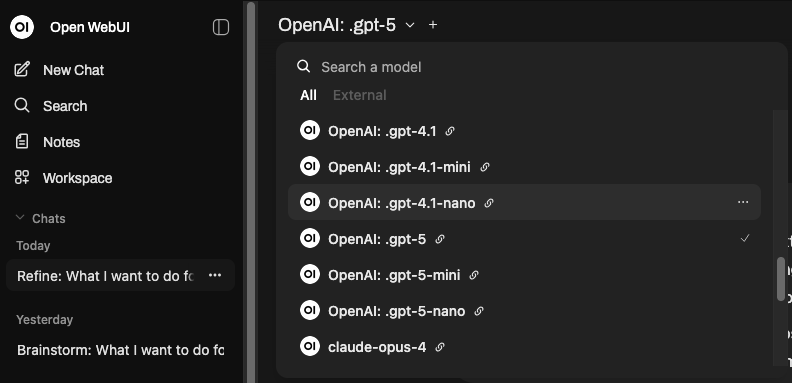
So I’ve had a rather chaotic month at work, and this means I’ve also had much less mental bandwidth to make any progress on the many, many side projects I would love to work on.
At the same time, this has offered me quite a fascinating opportunity; I have been talking about my career with my manager for a few months, and we think that I could be pushed to the next level with some intentionality.
Now, let’s be clear; my company is not very big - this is part of why I joined it in the first place - and at my level there isn’t really a ‘ladder’ to climb. So, this means I have the interesting problem of trying to carve out a role for myself.
An errant thought
I have talked about this with my mentor, with some close friends, with my wife, as well as my manager. And I’ve also done quite a lot of writing and reflection on this topic. At the end of all that, I wrote a blog post to force myself to sit down and really put things out on paper.
(Writing is a wonderful tool; I know not everyone likes it, but it really forces you to clarify your thinking)
And then as I finished this post, I wondered… What haven’t I thought about that I should think about?
You know what’s really good at helping you think about what you haven’t thought about? A life coach. But I don’t have one.
So, I thought I could try this with a couple of… non-life coaches?
To the LLM Playground
I have been playing with LLMs since they blew up, and have been maintaining and updating my own Open-WebUI service for myself (and close friends and family), and keeping this up-to-date with the latest models. API costs turn out to be quite manageable (I can certainly afford to drop $20 or $50 to top up every several months), and together with services like OpenRouter, Groq, LMStudio and LiteLLM, I can host a plethora of models for myself to try.
This turns out to be very useful when I just want to save a bit of time reading an article or listening to a podcast, or for times like this.
So, I took my blog post, dropped the text into Open-WebUI, pointed it at OpenAI GPT-5, and…
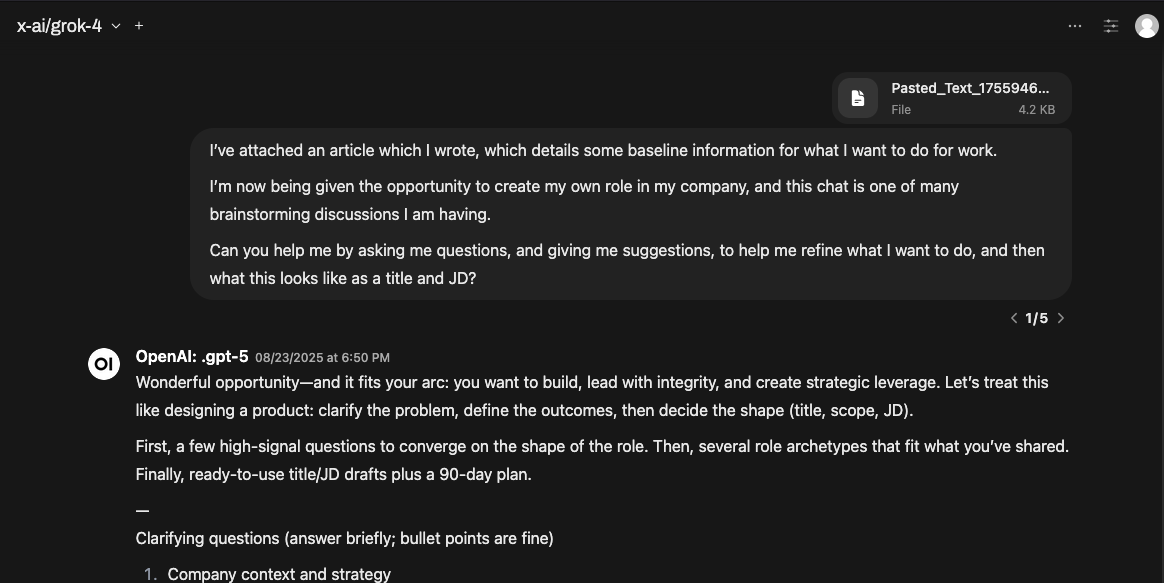
Then Claude Opus 4.1…
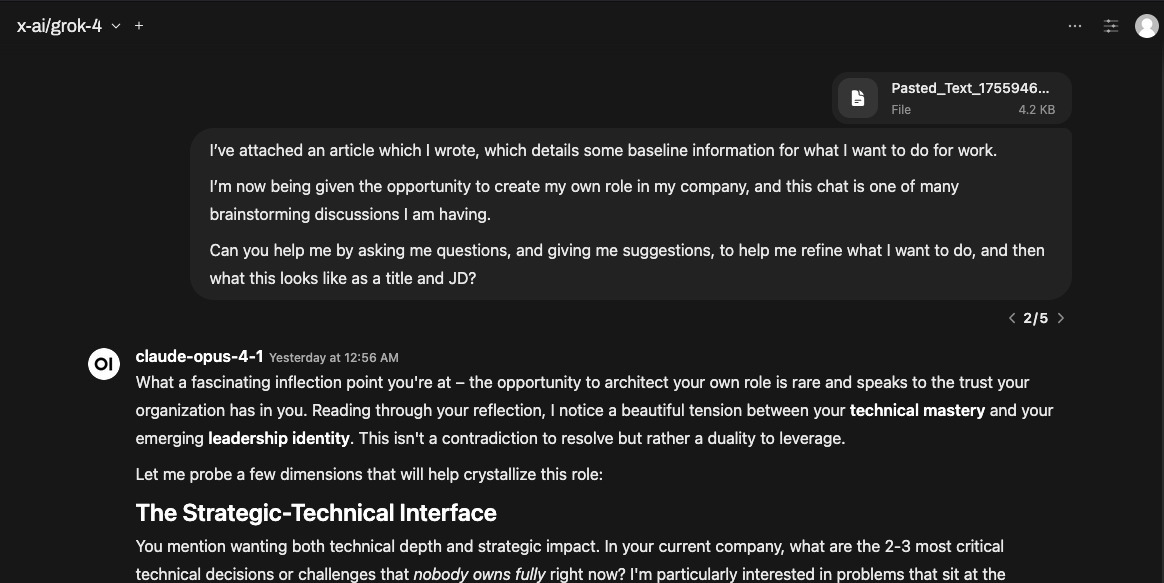
Then Google Gemini 2.5 Pro…
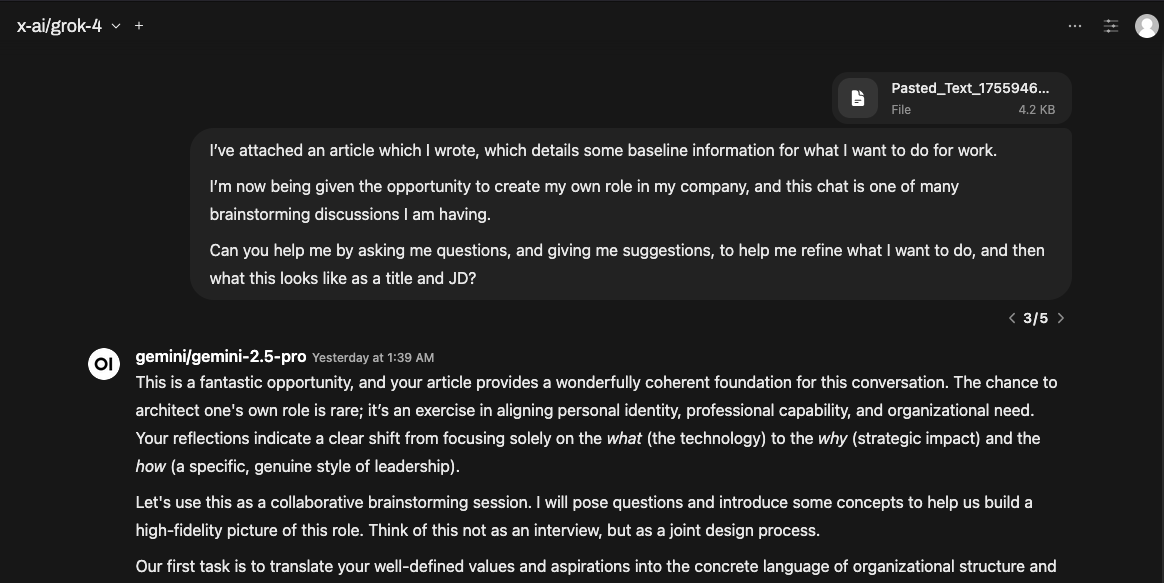
Then Deepseek Reasoner…
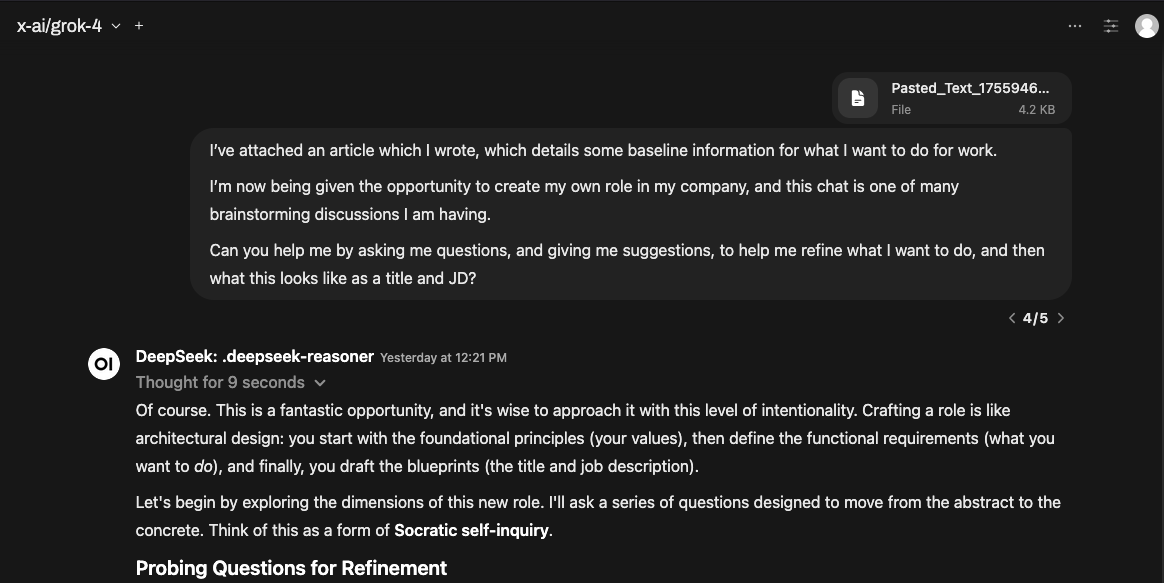
Then X-AI Grok 4…
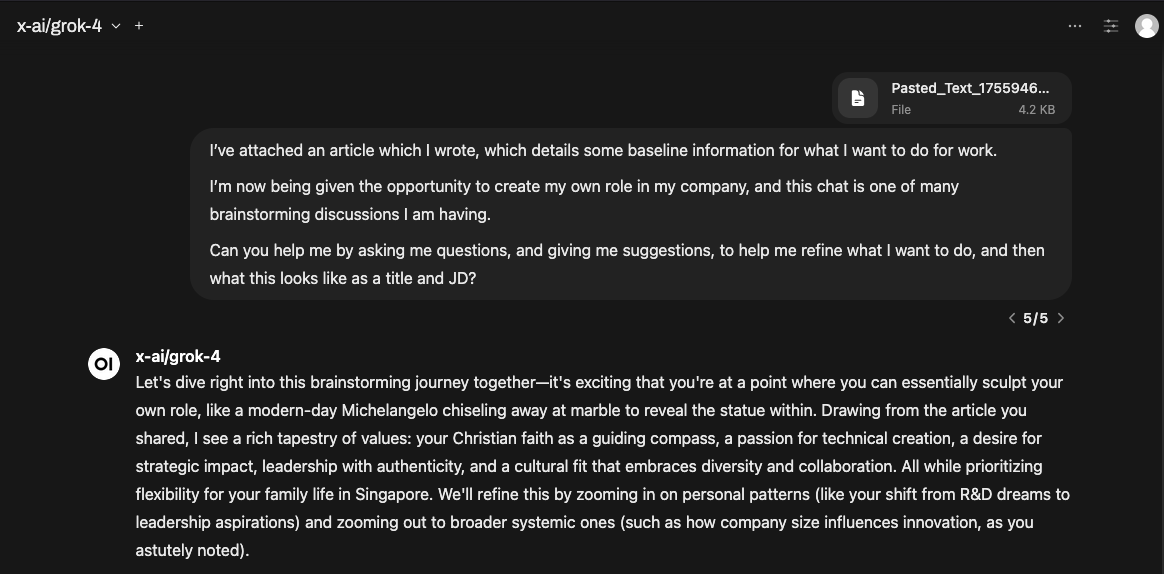
As you can see, Open-WebUI gives me a really convenient capability to swap through different chat branches, and even with a different model on each chat branch. This is especially nice for conversations like this where I have one topic, but I would like to explore several possible chat streams.
What did I learn?
Now, I’m not going to show the whole conversation (that might be too much sensitive information to share), but here’s some learnings I took away from the experience.
1. LLMs are getting really good at professional-quality work
I know this has been said by many people and in many different ways. I’m neither an AI Optimist nor an AI Pessimist; I’m just pragmatic. This entire exercise cost me only ~$0.2, even with all the top of the line models, and they gave me advice and pushed me to think about things at a level of a professional coach.
That’s not to say there won’t be a need for coaches; I might argue that you want a coach even more, now that you can be so convincingly led in some direction by a LLM. In fact, I think this is where it gets really difficult to quantify the usefulness of AI.
You could - and probably should - try it out
2. LLMs are heavily context-dependent
This entire exercise was only effective because I took the time to think, talk, and translate all the possibilities in the cloud of consciousness into something I could write down in less than 1000 words. This is what I fed into the LLM, and the ask was basically to help me test my own thinking.
If I was to simply go to the LLM and start the conversation with ‘I’m not sure what I want to do for work’… I don’t think this would be very helpful. Not because it wouldn’t try, and not because it wouldn’t come up with valid questions and suggestions, but simply because it would be too vague.
You really need to provide, and manage context when working with a LLM.
3. Different LLMs do have different ‘thoughts’
This whole observation about vagueness is only excacerbated by the fact that each LLM seems to have a ‘mind of its own’. So, it is a little bit like choosing a coach then, or an assistant or team member. And you do kind of want to be careful who you choose, even if the switching cost is low.
It’s really hard to give these a name right now, but here’s a little impression blurb for each.
GPT 5 feels like a professional, high-functioning individual
Claude 4.1 feels like a friendly, capable assistant
Gemini 2.5 Pro feels like a highly technical colleague
Deepseek Reasoner feels like a cultured, logical elder
Grok 4 feels like a talkative, flowery storyteller
All 5 of them stayed on topic and all except Grok 4 converged on the task completion within 3-4 iterations (Grok 4 kept asking more iterative refinement questions).
There’s probably something to think about especially as we start to consider using LLMs more and more for human interaction. You don’t choose your friends for no reason, and you don’t hire on the same basis as you choose friends. This is probably going to be true too for LLMs.
Knowing the model nuances may well become a new ‘social’ skill
Now what?
There’s plenty of talk going around, and plenty more to go. Will AI create dystopia or utopia? Will AI reach AGI in 2 years? Will we all lose our jobs, our livelihoods, our planet?
I don’t really see much point in dwelling on these thoughts too much. As a Christian I believe AI is a tool, and not a sentient being. As such the people behind AI - whether they are correct or not - and the people with power to advance or stop AI - however they are motivated - are going to be the problem, rather than AI.
But as a tool then, I think it is useful to know how it works, what it can do, and how I can use it. If you haven’t already, now is a pretty good time to try; many providers have strong incentives to give you a free shot right now. This may not be true in a few more years.
And who knows, maybe you’ll find some use for it after all.